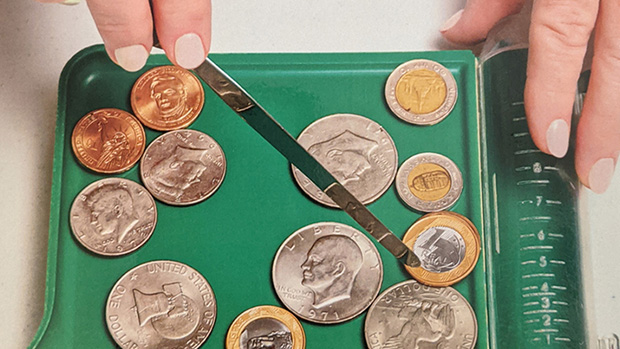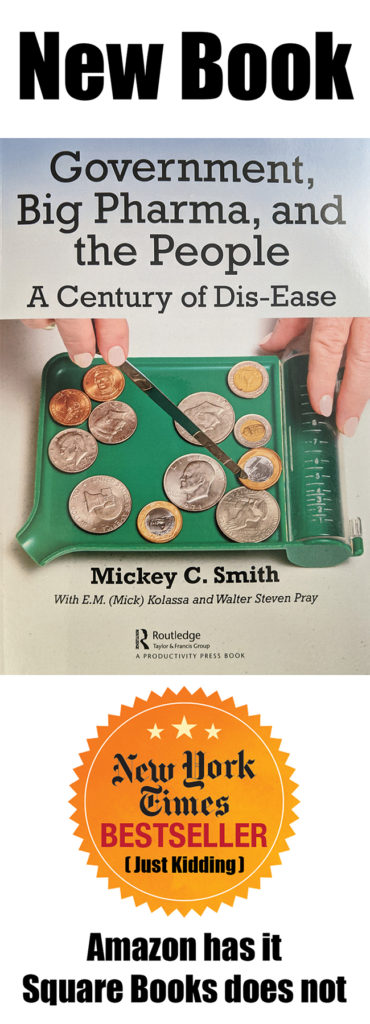
In his new book, Government, Big Pharma, and the People: A Century of Dis-Ease, Dr. Mickey Smith tackles the historic, economic, and social impact of “Big Pharma” and its relationship to government. Dr. Smith spent thirty-seven years on faculty in the Pharmacy Department at the University of Mississippi. After completing his education in St. Louis, he came to Oxford in 1962 to attend graduate school. Other than a short stint with Swedish company Pharmacia, which is now a part of Pfizer, Smith has spent his entire career at Ole Miss.
“I’ve been retired since 2003,” Smith said. “After my wife passed away, I went and looked around at the library there. I had been thinking about something like this [book] for quite a while.”
A spry, witty 82-year-old gentleman with a dashing moustache, Dr. Smith has written, co-written, or edited over twenty books in his lifetime.
“I was joking with [a friend] that I have more books than Faulkner, but he has that Nobel Prize thing, you know.” Smith laughed as he showed off his Faulkner t-shirt, a Father’s Day gift from his daughter.
Government, Big Pharma, and The People: A Century of Dis-Ease

What can you tell us about your new book?
“It’s basically a history book. It goes back to the early 1900s for the legal parts, the Food and Drug Act. Two parts are the most important. One is the way Congress has investigated the drug industry over the years. They’re still doing it . . . the same old way, haven’t changed one thing. They passed legislation in 1962 that created legend drugs, which are the drugs you can’t get without a prescription. This was monumental at the time because it changed everything—physician’s habits, pharmacists habits, and so forth. The other aspect I focused on in this book is one of sociology. What do people know about drugs? What do they do about it? Why don’t they take them right? If you think about it, it’s kinda weird. People will go to the doctor, sit there for a couple of hours, then go to the pharmacy and wait a long time, go home and not take the drugs right. The implications are incredible. They don’t get well, maybe. The doctor, typically, if you don’t call him back and tell him it isn’t working, he or she thinks it is. Also, if they don’t get a refill, that impacts the drug industry. Because refills are pretty much the life blood of the industry. That was what I tried to do, focus on that, and then come back around to the drug industry and talk about “greedy big Pharma.”
Is that a myth or is it true?
They are greedy. But so are we all in one way or another. There have been some bad things that they’ve done. But there have been some heroes in the drug industry. Do you know who invented Valium? Everyone’s heard of Valium. But nobody knows who invented it. I happen to have in my den an autograph of Leo Sternbach, who invented it. I invited him down to campus one time for a lecture. Poor ol’ Leo, he never gets any recognition. I asked him what was the best thing Roche did for him? He said they gave him a parking spot near the building.
Dr. Smith’s book is available on Amazon. He reckons it will be useful to students of pharmacy policy and marketing. From Amazon: “Pharmaceuticals constitute a relatively small share of the total Health Care expenditure in most developed economies, and yet they play a critical role in the ongoing debate over how best to advance, improve, and afford Health Care. Despite this, and perhaps because of this, the industry has had, for many years, an outsized claim to fame and controversy, praise and criticisms, and support and condemnation. Unfortunately, many participants in the debate do not fully understand the complexities of the industry and its role in the overall Health Care system. The author utilizes his 50-plus years’ experience as an academic, practicing pharmacist, and Big Pharma employee to describe the scope of the pharmaceutical industry and how it affects us on a daily basis, concluding with an inside look at Big Pharma and how regulations, marketing, and the press have affected their business, both good and bad.”
Dr. Smith is also involved in organizing a celebration for the University of Mississippi Pharmacy Department’s upcoming sixtieth anniversary. He is an avid reader and enjoys smoking pipes and cigars.




